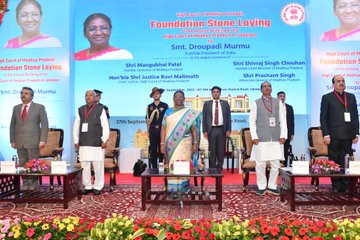President of India, Smt Droupadi Murmu laid the foundation stone for the new building of High Court of Madhya Pradesh at Jabalpur, Madhya Pradesh
The President of India, Smt Droupadi Murmu laid the foundation stone for the new building of High Court of Madhya Pradesh at Jabalpur, Madhya Pradesh today (September 27, 2023).
Speaking on the occasion, the President urged the every person associated with the judiciary to make efforts to provide simple, accessible and speedy justice to the general public. She highlighted challenges faced by judiciary such as large number of pending cases, huge number of under-trial prisoners, need of improvement of infrastructure in courts. She shared that about 4.5 crore cases are pending in lower courts across the country and many of these cases are pending for 20 to 30 years. She was happy to note that the Madhya Pradesh High Court has launched a special campaign named ‘25 DEBT’ to dispose of cases pending for decades in the district courts under which judges of the district judiciary has been told to dispose of the 25 oldest cases in their courts on a regular basis.
The President said that this is the country of ‘Panch-Parmeshwar’ and the concept of justice was present in our rural system from the beginning. She emphasised on strengthening further the system of alternative resolution of disputes. She stated that on the one hand, it would make the resolution of disputes cheaper and easier and on the other reduce the burden on the judiciary. She expressed confidence that by using the provisions of the Mediation Act, 2023, mediation would get widespread and institutional acceptance and the burden of litigation would be reduced.
The President said that technology is playing an important role in every field today. She added that the use of technology in judiciary has also increased very rapidly. She further said that while the ease of justice administration has increased with the help of e-court, video conferencing, e-proceeding and e-filing, conservation of natural resources has also become possible due to reduction in the use of paper. She was happy to note that the Government has recently approved the third phase of the e-Court project. She expressed confidence that the successful implementation of this phase would make the justice system more accessible, affordable, credible and transparent for all stakeholders.
The President urged organizations and groups of lawyers to come forward to provide pro bono legal help to the deprived class. She said that we have to keep in mind that the justice does not become so expensive that it goes out of reach of the common man. She added that there is a need to strengthen institutional efforts in this regard.
The President said that empowerment of women is essential for an inclusive India. She added that appropriate participation of women in judiciary is important. She said that women have a natural sense of justice and it is said that a mother does not discriminate between her children. She stated that the process of justice delivery is not based on any single mathematical formula and in the administration of justice, along with bookish knowledge, the use of practical wisdom is also required. Other dimensions like emotions, circumstances and sensitivity are also important in this process. Therefore, greater participation of women in the judicial system would also be in the interest of the judiciary.
The President said that when the perspective of self-correction by the judiciary comes to the fore, the name of Jabalpur automatically comes to mind. The decision given by Jabalpur High Court in favour of protection of life and personal liberty in ADM Jabalpur vs. Shivkant Shukla case was over-ruled by the Supreme Court in the year 1976. After 42 years, in the year 2017, the Supreme Court changed its decision and the basic principles of the then decision given by the Jabalpur High Court in favour of fundamental rights have been re-established by the Supreme Court. Thus, in the history of Indian judiciary, the name of Jabalpur has become a symbol of the progressive journey of the justice system.
The President noted that the new building of Madhya Pradesh High Court would be equipped with state-of-the-art facilities. She was happy to note that a separate Bar Room is proposed for women advocates. She said that this arrangement would be convenient not only for women advocates but also for women litigants. She expressed confidence that the new building, when completed, would give a new energy to the judges, lawyers and administrative staff to discharge their duties with greater dedication, commitment and efficiency.

